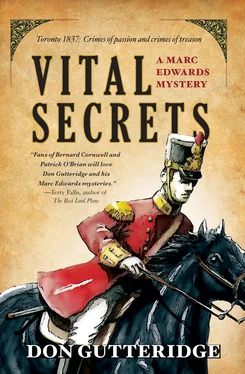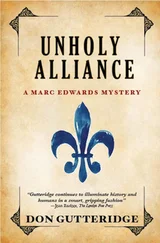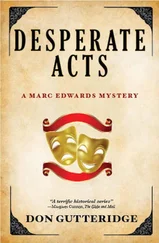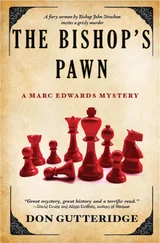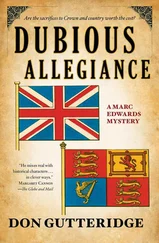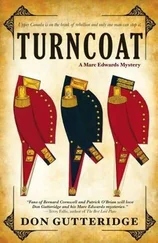Don Gutteridge - Vital Secrets
Здесь есть возможность читать онлайн «Don Gutteridge - Vital Secrets» весь текст электронной книги совершенно бесплатно (целиком полную версию без сокращений). В некоторых случаях можно слушать аудио, скачать через торрент в формате fb2 и присутствует краткое содержание. Год выпуска: 2011, Издательство: Simon & Schuster, Жанр: Исторический детектив, на английском языке. Описание произведения, (предисловие) а так же отзывы посетителей доступны на портале библиотеки ЛибКат.
- Название:Vital Secrets
- Автор:
- Издательство:Simon & Schuster
- Жанр:
- Год:2011
- ISBN:нет данных
- Рейтинг книги:5 / 5. Голосов: 1
-
Избранное:Добавить в избранное
- Отзывы:
-
Ваша оценка:
- 100
- 1
- 2
- 3
- 4
- 5
Vital Secrets: краткое содержание, описание и аннотация
Предлагаем к чтению аннотацию, описание, краткое содержание или предисловие (зависит от того, что написал сам автор книги «Vital Secrets»). Если вы не нашли необходимую информацию о книге — напишите в комментариях, мы постараемся отыскать её.
Vital Secrets — читать онлайн бесплатно полную книгу (весь текст) целиком
Ниже представлен текст книги, разбитый по страницам. Система сохранения места последней прочитанной страницы, позволяет с удобством читать онлайн бесплатно книгу «Vital Secrets», без необходимости каждый раз заново искать на чём Вы остановились. Поставьте закладку, и сможете в любой момент перейти на страницу, на которой закончили чтение.
Интервал:
Закладка:
“Well, such news as this calls for a celebratory drink,” Marc said, reaching for the sherry. Included among the “good news” was the fact that Thomas Goodall was too busy with the harvest, road-duty, and a new babe to be involved with Mackenzie’s rabble-rousers. “What do you say?”
“Oh my, Marc, I forgot to tell you, but I’ve been anticipating this letter so much it slipped my mind.”
“Not bad news?”
“No, no. Quite the opposite. As part payment for mending their costumes, the theatre people have promised me two box seats for tonight’s play. It’s a French farce of some sort, so it ought to be mildly diverting.”
Marc grinned. “It’ll take a lot to divert my thoughts tonight, but let’s give the theatre folk a chance to try.”
SEVEN
Marc took Aunt Catherine’s arm and they strolled eastward along King Street in the cool twilight of the Indian summer that the city had enjoyed for several weeks: warm and dry in the day and frosty and dry during the lengthening nights. As a result, streets and roads were amazingly passable, and conditions for the fall harvest were the best in recent memory.
The play was to start at eight-thirty, so they stretched their fifteen-minute walk to Colborne and West Market Streets to half an hour, pausing to enjoy the window displays of the many shops along King. At Church Street they admired the way the white stone of the courthouse and the jail seemed to have absorbed the last of the sun’s light and were now radiating it back into the semi-dark. Reluctantly, they turned south to Colborne, and swung east again towards West Market, a short block away. They were greeted by a scene that was anything but pastoral.
“Well, I didn’t expect this!” Aunt Catherine said.
Neither had Marc. Ogden Frank had pulled out all the stops for the four-day run of the Bowery Touring Company, the first professional troupe to grace his Regency Theatre. He had set bright candle-lanterns on stanchions all along the boardwalk in front of the building. Into their pools of light spilled a dozen carriages and their stamping, fretful teams. The rutted but dry streets had tempted the more prosperous citizens to drive to the Regency in style, though the reception was nowhere near as orderly as they might have wished. Frank had evidently hired a number of stable boys to act as grooms, footmen, and greeters-a few even wore some sort of ill-fitting crimson livery-but the lads, eager enough, were occasioning more confusion than courtesy. A team of matched grays and their vehicle was being hauled towards the stable yard with one outraged gentleman still in it, while his bonneted lady stood in befuddlement under the canopy of the false balcony. Another extravagantly attired chatelaine had her brand-new, imported boot stepped on by an anxious greeter, and in jerking away in pain, she managed to put the other boot into a puddle of fresh horse-dung. Farther down at the corner, a lead-horse had taken offense at the strange hand on its bridle and bolted, the vacant carriage clattering behind like a rudderless skiff. The sidewalks on both sides of Colborne were now jammed with couples and parties jostling and otherwise enjoying the drama on the street.
Aunt Catherine laughed out loud. “It’s like a dance at the Grange run by the inmates of Bedlam!”
Ogden Frank himself was oblivious to these minor lapses of organization, for he stood proudly in front of the oaken double-doors, accoutred in the military uniform his father had worn at the Battle of Lundy’s Lane. He exclaimed his welcomes so effusively that no one except his wife had any idea what he was sputtering at them. Madge Frank stood just behind him and took tickets from those few people she didn’t know and tried her best to smile on those she did. The three Frank children were acting as ushers inside, guiding patrons to their boxes or pointing others to the gallery above or the benches in the pit.
Marc boosted Aunt Catherine up the final step and into their box at the back-left of the main room. He held out a chair for her, then sat down beside her. There were two other chairs in the box, but no-one else came to join them.
“Milady Surprised,” Aunt Catherine read from the hastily printed program. “ A Farce in Two Acts. I think we’d better brace ourselves.”
Marc was looking at the transformed theatre around him. Candles, which had been lit in candelabra along the walls, threw a wash of pale light over the hundred or so people who were now filling the available seats. The stage area itself was brightly lit from above by three chandeliers and from below by six Argand lamps that served as footlights. Several flats had been erected at the rear of the stage to give the illusion of a windowed interior, and the most prominent feature of the various domestic props within it was a gigantic bed-Jeremiah’s handiwork, no doubt.
“I see what you mean,” Marc said.
To the left of the stage, near the curtained door, the enterprising Franks had set up a bar, behind which was temptingly displayed a tapped keg of ale. The interval should prove lively, Marc thought, even if the play doesn’t.
“Oh, there’re your friends, I think,” Aunt Catherine said.
In a box on the wall opposite but right next to the stage itself sat Owen Jenkin and Rick Hilliard among several other officers from the garrison. Rick was leaning on the railing, the better to stare into Tessa’s eyes during the performance. Jenkin waved at Marc and smiled. In the other two boxes across from him, Marc noticed many familiar faces from among the members of the Family Compact, along with two ardent Reformers, Robert Baldwin and Francis Hincks. Those in the pit and the gallery at the back looked to be a cross-section of tradesmen, small businessmen, and local farmers out on the town.
“My God, I don’t believe what I’m seeing!”
“What is it, Marc?”
“Over there, in the front row of the gallery. It’s Constable Cobb.”
“Why, so it is,” Aunt Catherine said cheerfully, and waved a hanky until she got Cobb’s attention. In turn he waved and smiled, as did the woman seated beside him.
“And he’s brought Dora. How nice.”
“You’ve met his wife?”
“Oh, yes. Horatio brought her along one day last August, for a new hat. She’s a very interesting woman.”
Constable Cobb had been a significant and courageous partner in the investigation Marc had led into the death of a privy councillor, during which the policeman had had occasion to visit the millinery shop and, thereafter, to stop in on his patrol regularly for tea and gossip. Since then, Marc had bumped into Cobb on the street from time to time, and always spent a few minutes reminiscing about their joint adventure. But the rough-edged constable’s appearance in the audience of a French farce surprised him. Was he here on some sort of official business? Nothing more could be said about the matter, however, because the players had now arrived onstage to an enthusiastic welcome from the drama-starved citizens of Toronto and York County.
Mrs. Thedford had assured them earlier that what they would see this evening would not in any way reflect the fractious goings-on of the afternoon rehearsal. And she was right. These were professionals through and through. Tessa’s French maid, in black satin and crocheted cap-and-apron, was sprightly, and her staccato dialogue and double-takes delivered with a speed and confidence that belied her youth and inexperience. Even the Yankee twang and dropped g ’s had vanished. And, as Mrs. Thedford had insisted, it was Dorothea Clarkson who did have to carry the play as the paramour of the philandering husband in the piece. As such, she was plopped in and under and behind the big, adulterous bed at stage-centre, in addition to being stuffed into a trunk and made immobile behind an arras, all the while emitting a series of aborted shrieks, cries of surprise, and wails of uncorrectable regret set amongst sympathy-gaining appeals to the capricious gods of love. She gave no sign of illness or fatigue and, in fact, her energy seemed to feed on the laughter she drew in raucous waves from every corner of the theatre.
Читать дальшеИнтервал:
Закладка:
Похожие книги на «Vital Secrets»
Представляем Вашему вниманию похожие книги на «Vital Secrets» списком для выбора. Мы отобрали схожую по названию и смыслу литературу в надежде предоставить читателям больше вариантов отыскать новые, интересные, ещё непрочитанные произведения.
Обсуждение, отзывы о книге «Vital Secrets» и просто собственные мнения читателей. Оставьте ваши комментарии, напишите, что Вы думаете о произведении, его смысле или главных героях. Укажите что конкретно понравилось, а что нет, и почему Вы так считаете.
